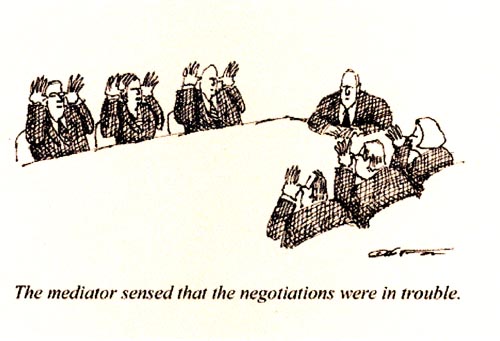Labor – Management Culture Clash
Labor and management are not simply adversaries at the negotiating table; they represent two very different cultures, if not social classes.
 IOZ offers some insights into the world of labor negotiations:
IOZ offers some insights into the world of labor negotiations:
I have had the occasion to negotiate union contracts, always on the side of management, and as I must–persistently and insistently–remind my colleagues, some of whom were also on the goddamned negotiating team, we agreed to the terms and conditions that we love to bitch about. CBAs are not imposed by powerful union goon squads on helpless managers, although hapless managers can be out-negotiated by the stubborn dummies who make up most union leadership. It isn’t a wholly unfair point that public employee unions benefit from negotiating with political factions they helped to elect, but anyone involved in a large enterprise with a union shop (or several) finds this point, pulled out like a real Trump in the linked Welch post, likewise faintly laughable, because it is always, always, always the case that mutual interests muddy the adversarial nature of labor negotiations and drive both sides to make disadvantageous concessions in the name of the collective scam.
Management in any case has all the real advantages in a negotiation if management is willing to use them. But most of the time, managers are lazy negotiators and fail to do their work in advance. An unconquerable belief that unions are irrational combined with a childlike wonderment in the face of a bargaining unit that does not acquiesce to management demands with the supine, college-educated spinelessness of the at-will staff in the upstairs offices, leads managers to enter negotiations with functionally final proposals. A few union officials willing to start off asking for the sun, moon, and stars then move toward a more agreeable (for them) middle, which is still far from what management wants. But management just sat dumbly reiterating the points that it thought every rational person would naturally agree to. And in the end, managers are pissed that they got what they consider a bad deal, because it was not the shining deal they wanted, and they act like they had nothing to do with it, even though they were at the table the whole time.
While I tend to take management’s side in labor disputes, this strikes me eminently plausible. Labor and management are not simply adversaries at the negotiating table; they represent two very different cultures, if not social classes.
Blue collar types instinctively understand that these classes exist and that there are huge differences in attitudes and perspectives. For reasons inexplicable to me, though, highly educated people seem blithely unaware of the world around them, proceeding as if everyone on the planet is just like them. This not only allows them to believe that the world is perfectly meritocratic and they got to where they are purely because they’re smarter and hard working than most but it translates to international politics and the notion that the average Kalahari tribesman would be no different from the average Swede given freedom and a decent meal.
Given that, it makes sense that management would come to the negotiating table with something approaching their anticipated final deal — no sense wasting time with unreasonable proposals — and then react with bewilderment that the other side isn’t as reasonable.





I read the claim recently that workers and management were actually less confrontational in Europe these days, and that unions do not always win placement in works councils.
That wouldn’t surprise me, because one theme I see in politics in general, and union questions especially, is that most people seem to be arguing from an imagined past.
To be honest, unionism as class conflict is very pre-1930 … but that doesn’t mean people will lose their emotional attachment to it.
@john
Having worked in various European countries for close to 15 years I confirm what you say about union/management relations being much less confrontational (with large differences from country to country).
From what I noticed there are two main causes:
– management usually sees unions as partners rather than adversaries
– unions are more proactive in creating services for their members. For example, in some countries unions were the first to actually run health-insurance companies.
One must also not forget that the social safety net is much more extensive in most European countries (and in Canada) than in the US, which also helps the overall atmosphere.
Between them the Wagner Act and the Taft-Hartley Act ensure an antagonistic relation between unions and management that is not the case in Europe.
I agree strongly with the sentiments expressed by IOZ. Management has the edge in negotiations, if they chose to use it. Those too good to be true contracts that were handed out in the past were due to poor management. When you look at the European experience, there is nothing intrinsically wrong with unions that I can find. Granted, without unions, lazy management has an easier job. Negotiating wages is just part of the way that I think a free market should work.
On public sector unions, in particular teacher unions, after hours of sifting through what data I can find, it is not clear to me that unions help teachers all that much. AFAICT, tenure exists outside of unions. Decisions about teacher pay and class size are made at the local level.
Steve
@James,
“While I tend to take management’s side in labor disputes…”
No kidding. I got a big chuckle out of one of your original posts on the Wisconsin debacle, where you cited the benefits of collective bargaining as being mostly about saving management the inconvenience of negotiating multiple similar contracts.
When “holding management accountable for not abusing the work force” isn’t high on your list of the benefits of unions, I think we’re dealing with a company man.
As a longtime government employee and current management weenie, I have seen how the cards are stacked against the employee when management decides to use the hammer in the disciplinary process. Management knows all the insides and outsides of the rules and regulations and legal histories, as well as its own staff of lawyers and investigators. The employee is pretty much alone without a clue and has to pony up for his/her own lawyer at great expense to fight it. Anybody knows that the only a fool would have hire himself as his lawyer. In the public sector, the unions exist to prevent management abuse. We all know it happens. Just read up case histories of the Merit System Protection Board.
Perhaps as Dave says, the Wagner Act and the Taft-Hartley Act have helped trap us in the past.
But surely we verge on a generational change. Divergence between the worlds of new entrants and retirees is like the theme for the early 21st century.
There are actually three cultures in the negotiations, Management, Union and the employees. The union and the employees have linked but different interests. The union wants to be as adversarial as possible to get the sweetest deal to use as incentive for the employees to keep paying dues. The employees want a decent deal but also want to work in a nice place that doesn’t go out of business. Management, unfortunately, sometimes looks to the short term and agrees to terms that are disastrous in the long term.
These differences are worse in the public sector where the employees don’t fear the loss of the enterprise and the management doing the negotiating are usually internally promoted former union members focused solely on keeping their union-funded political rabbi happy in the immediate cycle. Missing in the equation is anyone concerned with the taxpayer who is forced at gunpoint (often union member held gunpoint) to cough up the money to pay for the governmental malfeasance.
john personna – if you listen to the rhetoric on both sides you hear the voices of the 1920s with little application of the realities of the intervening 90 years. And little acknowledgement that since the 1950s, unions have held the influence over government and unrestrained power across jurisdictions held by JP Morgan in 1900.
“. And little acknowledgement that since the 1950s, unions have held the influence over government and unrestrained power across jurisdictions held by JP Morgan in 1900.”
Then why dont they make more money? Why did the finance sector guys make huge amounts of money while it is difficult to figure out if union members actually make more?
Steve
I think I’d say that it should be four: add stockholders. There’s a serious problem in corporate culture in which boards of directors have rubber-stamped management compensation plans and corporate strategies that aren’t in the interests of stockholders.
IMO there are a number of reasons for this: the move towards professional management, a trend in management compensation that over-emphasized stock ownership abd allowed short term trades, and the increasing importance of institutional investors, just to name a few.
Another thing I wanted to mention. Rather than talking about “management” and “unions” I think it’s helpful to be more concrete. Let’s look at the specific cases of GM management and the UAW. Starting about 40 years ago what should each of those players have done? What differences in conditions would have made that more likely? Why did they do what they did?
Unless we deal with those questions in a coherent manner I think we’re just dealing in vapid, airy generalities.
@JKB,
If your model was accurate we’d be seeing that unionized public-sector employees are grossly overpaid/overcompensated and that the inequity continually increases. But as Krugman has been pointing out recently, most every study shows that that just isn’t the case.
The “brake” on compensation is that politicians really do have to balance their budgets, at least on the state level, and can’t just promise the moon and stars. Of course management wants labor peace, and of course they’re willing to be generous to avoid a strike. *But* Krugman shows that they aren’t being any more generous than private sector managers, even after all these years of your hypothetical feedback loop.
Given that, it makes sense that management would come to the negotiating table with something approaching their anticipated final deal — no sense wasting time with unreasonable proposals — and then react with bewilderment that the other side isn’t as reasonable.
But Wisconsin is the opposite of this scenario. The union is the party agreeing to make cuts. It’s the Republicans who are asking for everything.
@Andyman:
My position is that it’s useful for both sides to have a framework in which to operate rather than having to reinvent the wheel. An individual laborer would have no clue what to ask for without a salary scale. And labor can help avoid “abusive” conditions simply by having a common voice.
steve – I said “Unions” not union members. In 1950, John L. Lewis held the influence. I’d say Andy Stern does today given Obama is pretty much SEIU’s man in the the Whitehouse.
Read my first comment, there are unions and their are employees. Their interests are not always aligned and the employees are often just fuel for the union fire.
Andyman – in case you missed it, the issue today is that the politicians did avoid going to far out of the box on immediate compensation but sold the states down the road in long term pension and healthcare obligations.
And yes, it happened in the private sector. For their immediate interest, the managers sold out the long term viability of the enterprise with unsustainable pension and healthcare benefits. Perhaps you remember one of the worst offenders which the Obama administration used public funds to keep it from its just end, GM. Kind of ironic that the government moves to save one of the last big Trusts formed in the waning days of Robber Baron period to save the UAW from the consequences of their overreach.
“Labor and management are not simply adversaries at the negotiating table; they represent two very different cultures, if not social classes.”
Au fond, as the frenchies say, they despise each other, each thinking the other is out to screw them.
Having been in a labor union, and having a close family relative who was hyper successful corporate CEO, partly because he managed to keep unions out of his very,very successful enterprise. A company, you have all heard of.
He was unique, and ran an unusually paternalistic model for his company. I worked in the same industry, in a different company which was heavily unionized. The managment model in my company, was a very successful Machiavellian one, and quite often sought out confortation with its employees as a tool.
My particular union, had Wharton MBA types in leadership positions, but at the end of the day they became just as corrupt as the ex-truck driver types running the Teamsters.(I think unions are corrupt by their nature)
As for my preception of our Corporate management……well they were corrupt from the first day to the last. That is just the nature of that beast. Their first and foremost loyalty by far, was to their own self interest, and the stockholders be damned. So you can imagine how they looked on their employees.
So there you have it, employees who can, join the union as a defense mechanism against the short term, self interested maximizers who pass as the management elite, in today”s America. I might add, they join the union as a defense against the Union leadership also. Parking lot accidents, and all that.
But at the end of the day, my job would have not been worth having with out the Union protections.
Its a “hell of a world” isn’t it?
BTW, maybe the finest movie ever made on labor-management relations is the English film,I’m Alright, Jack. Highly recommended. Nobody gets out of it alive.
@JKB,
I think conservatives are conflating two distinct concepts here. “We’re having a hard time affording you” does not equal “you’re overpaid”. Walker is using the *extremely* arguable truth of the first statement to allege the second, which most studies pretty much blow out of the water.
The fact of the matter is that the people running Wisconsin claim that they’re having a hard time paying for some of the benefits of the public employees. That’s a far cry from saying that the employees shouldn’t have gotten them, or that the normal negotiation process is broken, or that drastic union-busting is necessary or appropriate. There’s rough parity between the public and private sectors for the most part. Wisconsin workers fairly negotiated for a fair wage, and now they’re being asked to give some back for the sake of the state’s fiscal health. That may or may not be just how the cookie crumbles but I don’t see how that possibly makes the unions the bad guys.
I think you’ve just put your finger on my core intellectual problem with Republicanism and conservatism. The defining intellectual difference between Cons and Libs is that Cons have almost no imagination and Libs have almost no math skills. It’s aspergers vs. empaths.
(Of course that’s off-topic, since unions aren’t liberal as a function of a pattern of thought, merely by virtue of self interest)
JKB — I’d guess you’ve never actually belonged to a union, hence your willingness to parrot the right wing line that the union really represents its own management and only secondarily the workers. I am sure there are lousy people in the upper echelons of some unions, as there are in the upper echelons of some companis (and some governments). But this notion that unions only care about sucking dues out of their membership is a deliberate lie spread by the right to separate workers from their bargaining agent.
Are union negotiators more confrontational than an employee would be? Of course they are — that’s what they exist for. Just as my agent can be as aggressive and abrasive as he needs to be to make a deal for me, and when I get what I want, he’s the one who looks like a jerk.
” I said “Unions” not union members. In 1950, John L. Lewis held the influence. I’d say Andy Stern does today given Obama is pretty much SEIU’s man in the the Whitehouse.”
Then why arent the “Unions” achieving much if they are so powerful? Having read bunches of papers from the right and left and libertarians, it is not clear that there is much benefit to belonging to a union recently. Even in the current Wisconsin setting, the unions agreed to all the pay cuts needed to help balance the budget. Why do teachers in the U.S. continue to get paid worse, based on per capita GDP, than most other OECD countries?
To be clear, I think that there are potential problems with public sector unions. I have said here and elsewhere that I think they should go to defined contribution plans just like everyone else, but then they should also be eligible for Social Security like everyone else. My problem is that when I go to look for evidence in concrete numbers that public sector unions are leading to outsized compensation I do not find it. I see studies supporting the claim and studies supporting the other side. In order to make their case, both sides have to make assumptions that are based upon ideological preferences.
Steve
Most discussion of American labor relations miss the impact that US labor laws, and in particular court decisions, have on the make-up and behavior of US labor unions. The Wagner Act requires companies to bargain with unions, unless the membership is supervisory or managerial. The Yeshiva and Kentucky River decisions expanded the definitions of these terms to the point that anyone who makes any meaningful decisions at all, or who takes even a de minimum leadership role in the workplace, is denied the right to be in an effective union.
So it’s hardly surprising that unions have a different mind-set than management. The law virtually guarantees that.
@Dave- From my POV, GM’s execs and its unions believed that they would stay on top of the auto manufacturing world forever. GM’s execs were the highest paid in the world. The union thought that they should also be well paid. But, management has a fiduciary responsibility, I believe, to the long term prosperity of the company. They are the ones who had the responsibility to not negotiate seals that would fall apart if market share dropped. They opted to pay less in short term salary and more in long term benefits. When market share went down, this plan failed.
Steve
Unions are powerful? Only 12% of American workers are in unions. How much lower does it have to get before conservatives stop pretending that George Meany and Jimmy Hoffa run the country?
Steve, not sure what years you are talking about, but I believe the 80’s reportage that Roger Smith knew what to do, but couldn’t get it done. It was turning an ocean liner … but one with a locked rudder. A locked labor relationship was part of that.
I could hardly have said better myself. Actually, I’ve said almost the same thing myself. I hold management primarily responsible. Unions do not have the fiduciary responsibility to the company that managers do.
However, I think that both top management and union leaders have been mortally guilty of short-sightedness. IMO union leaders’ responsibility is not limited to present membership (and themselves) but extends to future membership and the union itself. Over the last several decades union leaders have presided over a precipitous decline in union membership in the private sector. This is an abject failure of fiduciary responsibility.
As to public employees’ union I don’t believe they should exist at all. The conditions in the public sector and private sector are very different. Notably, private sector union members don’t get to elect top corporate management.
JP- I am thinking earlier. GM’s management planning was based on the assumption that they would maintain market leadership and keep growing. They ignored competition. The oil shock of the 70s clearly hurt them a lot. They made lots of bad management decisions about their products. No small cars in their product line for one thing. Anyway, on the labor side they locked in very long term benefits and salaries. IIRC, didnt they tie salaries to inflation somehow? Could Smith have turned things around? Don’t know. I suspect it would have meant major short term problems and American management has been overly focused on the short term for a while IMO. Maybe smomeone else knows more about the Smith era.
Steve
The worst thing in the GM saga was that they built Saturn as a small car brand, and then made it a typical GM everything-brand before scrapping it.
Dave Schuler — Thirty years of Republicans and Democrats in Washington colluding with corporations to wipe out organized labor — and you blame union leaders for their decline in membership. It’s a fascinating point of view…
I think Washington and the corporations were after cheap labor with globalization, and that maps imperfectly to an anti-union strategy.
To the extent that some unions fought automation and reduced labor inputs, they hastened the effect of the trade change.
We now know that you can outsource, or you can reduce labor input, but if you keep on paying high rates for high labor content, no one will buy your widget.
(We probably remember the textile workers “look for the union label” campaign, but we ended up with a surprising amount of our clothing coming from Vietnam, of all places.)
Essentially what john personna said above.
@john personna: “We now know that you can outsource, or you can reduce labor input, but if you keep on paying high rates for high labor content, no one will buy your widget.”
Yup. And, now, we’re getting to the point where even highly educated workers face competition from overseas.
This is negotating 101. I’ve seen it in my job (not in labor negotiation, but rather settlement discussions). You do not, EVER, start off with what’s “reasonable.” The other side will not. They will ask for the Moon. You’d better offer them a speck of dirt and work your way to an acceptable middle ground. Otherwise the negotiations will either fail (if you refuse to budge from your “reasonable” start point) or you will end up with a crappy deal (if you do budge).
Granted, I had to learn this. My temperament (and college education? 😉 ) pushes me toward the stupid “let’s just cut right through all this and offer a reasonable deal off the bat” approach. Part of me will always hate that it doesn’t work.